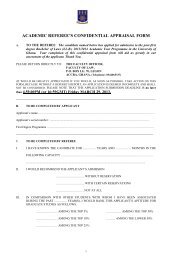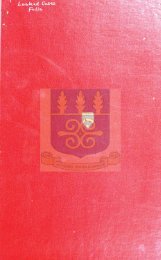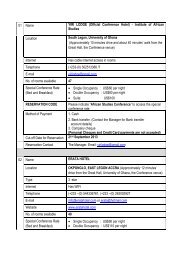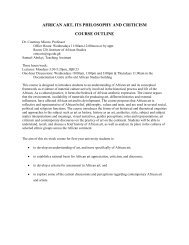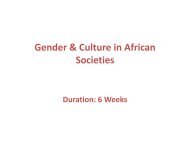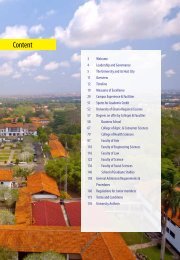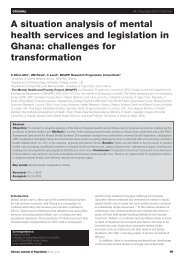View/Open - UGSpace
View/Open - UGSpace
View/Open - UGSpace
You also want an ePaper? Increase the reach of your titles
YUMPU automatically turns print PDFs into web optimized ePapers that Google loves.
DA- CIR C,i J L AT ! N GYUN TapeAPRIL 16. 1990AMBASSADOR ABBA EBANNEW YORK CITYSUTTERLIN. InterviewerTable of Contents UN/SA :I. UN Role in the Establishment of IsraelTransition of the Palestine Question to the UN 1-3Soviet Policy 3-4; 24-27The UN Special Committee on Palestine 4-15The Status of Jerusalem 11-15UN Constabulary for Palestine 16-20US position on Partition 20-24The Attitude of Trygve Lie 27-28Israeli Attitude toward the UN 28-34II.The 1956 Suez WarIsraeli MotivationsLester Pearson's Contribution34-3636-40The Understanding on the presence of UNEF 40-43Assessment of UNEF 44-45III. The Attitudes of US Presidents Toward the UNRole in the Middle East 49-54IV. Impressions of Kurt Waldheim 54-55
YUN TapeAPRIL 16. 1990AMBASSADOR ABBA EBANNEW YORK CITYSUTTERLIN, InterviewerJSSAmbassador Eban, I'd like to first express appreciationfor your participation in this oral history project, andif I may I wouldlike to begin at the creation, so tospeak, to use Dean Acheson's phrase, and take you back tothe special session of the General Assembly whichconvened in April, 1947. At that time the United NationsSpecialCommittee on Palestine was established and Ibelieve that you accompanied that committee asrepresenting the Jewish agency when it went to the MiddleEast.Two of the Secretariat members accompanying thatcommittee subsequently were awarded Nobel Peace Prizes,Garcia Robles and Ralph Bunche.Eban Robles received the Nobel Prize for what? He didn'tget the Peace Prize.JSSYes, he did, I think.Eban I'd like to look into that. He was very minor.JSSWell, that was exactly my question, how did the committeework in terms of the accompanying Secretariat people? DidtheSecretariat people have very much influence on thecommittee's findings, or not?EbanI'd like to say first of all that for the United Nations,2
historically, this was a very big challenge,it was thefirst important problem brought to the General Assembly.The United Nations Security Council had to deal withcrises, especially Iran, and later on Indonesia. Buthere was one of the founders of the United Nationscalling for a recommendation on a majorinternationalissue with the widest implications. The decision wastaken in London in February and it took us, the Zionists,by surprise. The assumption was that the British weresomehow going to carry on with thisresponsibility, weknew that they were getting impatient throughtheir ownfrustration. And Bevan, who was the central character ofcourse, was extremely impulsive. We also knew that manypeople in Britain were asking, why should weBritishcontinue to carry this charge when no less a voice thanWinston Churchill, the leader of the opposition, had saidthat we should stop thissqualid war against the Jews;either carry out the mandate in its original terms orelse hand it back to the United Nations, or at least getthe United States to come in instead, but he did use thewords the United Nations as the successor to the Leagueof Nations. Then this obviously was a concretepossibility.Nevertheless, in February when the Britishannounced their intention there was surprise and noelation because from the first examination of theproblem,the conclusion from the Jewish point of view3
wasthat we would fare even less well under the UnitedNations than we would under the Mandatory Power. And westarted making the count.JSS It came really early, if I may say.Eban It certainly did. The Arabs began with 5 or 6 votes inthe Moslem countries.We thought that the Latin Americancountries would be dominated by Catholic theology, thatthe Jews ought to be a wandering people forever.Nothingto hope for, obviously, from the Soviet Union whichregarded Zionism as a kind of conspiracy against theSoviet Union.Nevertheless it was a new challenge in theopen arena and it wascompletely different working witha multilateral international organization than in a kindof exclusive relationship with one power - two completelydifferent techniques.Therefore we approached this witha kind of innocence, and apprehension, and were surprisedat the momentum which had then developed.The first meeting was in New York and it only hada procedural purpose, which wasto appoint a committeewhich would investigate and then make its recommendation.It became very substantive not only because mostcountries gave some indication of their predilections ortendencies, but because the Soviet Union ignoredcompletely the normal procedural limitations and made avery dramatic and far-reaching announcement of a changein its policy. In fact the Soviet Union was the first4
great power which openly said that Israel should be aJewish state - admittedly is an alternative to theidealof living together. In expressing skepticism about that,they said quite openly that if the two parties cannotlive together eitherfederally, or as a unitary state,then Palestine should be divided into two states. Atthat stage, already the United Nations sprang into theheadlines as the forum from which a very monumentaltransition was made in the policy of oneof the greatpowers. The Soviet Union was persistent and constant inthis for the next 2 or 3 years.The other innovation (and the last occasion on whichI believe it was used) was the deliberate attribution ofmediation to a committee of medium or small powers.Since then oneis familiar with great power mediation,one is familiar with individuals like Frank Graham, likeGunnar V. Jarring, and others in the Cyprus problem -usually either Secretariat people or people brought in asthe servants of the Secretary-General. One is familiarwith the Secretary-General, himself, mediatingconflictsas Hammarskjold did, and as the present incumbent hasdone since.But I don't find anything in United Nationshistory to compare with the idea of eleven membernations, medium and small powers. I don't know how theidea arose, probably because the super powers didn't wantto show their hands too early.And these eleven member5
people who were represented - they were not peoplewere central figures in their countries' diplomacy.whoHereand there was a judge like Sandstrom and Rand;somebodywith colonial experience like the Dutchman, AmbassadorBlom.Here and there would be a member of the ForeignService like Hood, the Australian.I would say it wasn'tthe most brilliant array of talent one could imagine.Few of them had wide international experience andtherefore the Secretariat became important. And itbegins with Trygve Lie who was a very activist Secretary-General. The fact that Hammarskjold was even moreactivist has tended to obscure this fact but he took anextremely assertive view of his role. First of all, hewas the first Secretary-General, and therefore would setthe tone.The three people he appointed were VictorHoo, Bunche and Robles. Stavropoulos was the legaladvisor.It became clear rather early on that althoughBunche was Number 2 he was, in fact, the central figure,I think, by reason of being an American as distinct frombeing a Taiwan Chinese. Also Victor Hoo was a verypassive sort of a person. He reminded me of what somepeople were later to say about U Thant.When it wassuggested that he was inscrutable, somebody said, wellthere's nothing there to "scrute".I can't remember inVictor Hoo any expression of an attitude, while Bunchewas to be taken very seriously - a decisive, dynamic6
character.It is clear that his influence was great onpeople like the Chairman, Sandstrom, and on Justice Rand,who became a really dominant figure and was the first tomove the committee in the direction of partition.Herewere the two very effervescent Latin Americans, Granadosand Fabregal; and the quieter Latin American, Salazarfrom Peru.Obviously to pull that eleven together (andyou know that in England eleven is a soccer or a cricketteam) the Secretariat had to be very active.There wasa multiplicity and diversity of approaches.For example,Granados was palpably anti-British because of the Belizeproblem.The tendency we would have thought of many ofthe others would have been rather one of deference to themandatory power because there was Canada and there wasAustralia at a time when they were only just beginning tofeel complete sovereignty within the British Commonwealthand Holland - these are countries which had taken refugein Britain during the Occupation.And Czechoslovakia wasstill the Czechoslovakia of Masaryk, not of theComintern.The Secretariat, therefore, in defining theagenda and in reaching consensus, was very active withBunche as the Secretary.JSSAnd would you say that they had influence - Bunche inparticular- on the move toward partition as therecommendation of the Committee?Eban First of all, partition was already a fashionable7
doctrine because the British themselves had pioneered itin the 1930s. They were under the influence ofone of them, Sir Reginald (inaudible) ,whose approach was much more analytical-intellectual thanit was diplomatic-political. The area of his disciplineat Oxford was the conditions in which nations could orcould not form a state together. Later he was to relatethat to the Indian problem and was probably the author ofthe Atlee Commission report which led to thepartition.He was interested in why, if it was possible inSwitzerland, if it was possible in Canada and Belgium,why was it not possible in India and in Palestine? SirReginald thought that the idea that this is a nation,that the Jews and Arabs constitutea single entity andcan bring themselves to have a single allegiance wasjustgrotesque. He once put it to me graphically. He said"I've spoken this morning to Ben Gurion and to JamalHussein. For you to tell me that both would salute thesame flag or be responsive to the same set of values,it's nonsense. And he made this historic statement: theidea that there's such a thing as Palestinian nationalityis a mischievous pretense. There is no such thing. Weare quite different from one another and we can onlytherefore maintain a unitary state by suppression, wordswhich would become prophetic.In other words, you haveto deny either one or the other, an expression of8
nationality or a unitary state which can only bemaintained as a unitary state by increasingly harshrepression, something that Israel is finding out now.Because each of these entities wassufficiently turbulentand individualist and particularist, not to be digestedby the other, neither of them could subdue the other,butneither of them could accept the other.So when Gromykosaid "partition", he was saying something familiar. TheUnited States at one stage (through Dean Acheson) hadsaid in response to Zionist pressure in 194 6 that one ofthe proposals - in fact the Zionist program - waspartition. The phrase was (I remember because I had justjoined the Zionist Secret Service) "a viable Jewish statein an adequate part of Palestine". This was a compromiseof the great Israel idea. And if that was a Zionistproposal it had been a British one, very eloquentlydefended. The British had never abandoned itintellectually, they just abandoned it because ofappeasement. They just didn't want to do what wasnecessary to put it into effect. And therefore, becauseof Arab interest they just abandoned it because ofstrategic nationalist egoistic interests. They neverthought it was wrong, andin fact tried to revive it in1944 when Winston Churchill appointed a commission underthe chairmanship of Herbert Morrison, a very seniorcabinet member. And what they did was to call for9
partition in November 1944.When Lord Hoyne was murderedby one of the terrorist groups, Churchill in angerabandoned the whole business, the Egyptians hanged thesetwo people and the partition committee dispersed.So itwasn't a sudden kind of innovation.And it was naturalthat when the Committee met (and I think this wastheinfluence of the Secretariat) Bunche laid down thepossibilities, and at the end when it came to Geneva thiswas how they analyzed it:What are the options?The whole of Palestine as anArab State, the whole of Palestine as a Jewish state,Palestine as a federatedentity under a unitary systemof partition. The discussions were pretty well channeledinto these four options - I should have also listedcontinuation of the mandate. In other words,they wrotedown theseoptions and studied them in the course oftheirbusiness.The Secretariat had a very large role. Once theydefined the nature of the problem (as everybody knows inscience,scholarship and even in legal judgments) theyhave gone a long way towards narrowing it down becausesome of the options become obviouslyunfeasible.JSS Mr. Horowitz I believe was your colleague at thatpoint.Eban That was an important innovation because this was thefirst time that Zionism was recognized in the United10
Nations system - by appointing two liaison officers whowere of the Jewish Agency. The United Nations reallysaid,well the Jewish Agency is the representative body;they didn't ask if we had any elections. The reason whythere was no argument was that the Jewish Agency alreadyhad an international status that derived from thejurisprudence of the League of Nations. The mandate ofthe League of Nations said that there shall berecognizedor established a Jewish Agency, with which the mandatorypower shall cooperate. One of the great achievements ofthe Weizmann wasnot only to get the Balfour Declaration- the Zionist Policy - endorsed by Britain but also toget a unanimous League of Nations to endorse the Zionistprogram and the status of the Zionist organization. Myfeeling is that the Secretariat had a great part ingiving conspicuous place to partition as one of theoutcomes.JSSAnd you, representing the Jewish Agency, did you at thatpoint assume that partition would in fact be thedesirable recommendation, and did youEban Yes. This was the banner that we carried. We wantedthat and nothing else. We no longer wanted acontinuation of the mandate because Ernest Bevin wasveryabrasive toward the Zionist point of view. Nobodyunderstood why he was with such radical extremism. Itcan only be understood in terms of individual psychology.11
I believe in the role of the personality of history.Sowe didn't want that to continue since it would eventuallyhave led to an Arab state. We didn't want an Arab statein the whole and we didn't want the kind of federal statein which the Zionists would be a rather minor kind ofprovince, predominantly under Arab rule. Ben GurionandWeizmann - though they were not always in agreement witheach other, were the twofigures that counted, especiallywith the United Nations Committee. I would say thatWeizmann counted more than Ben Gurion, even though hewasno longer in office. That was regarded as the pro-Jewish, the pro-Zionist thing to do and when Gromykomade his statement, it didn't sound so crazy because ifin February we had put the Russians in the negativecolumn, they were notallies. It began to look as if youcould get a majority. We really needed the United Statesand we were pretty well home. We knew the UnitedStates had a bias towards it although it was not verypopular in theState Department.JSS Let me ask you.in that connection about the geographicdivisions, so to speak, and in particular aboutJerusalem. The recommendation of the SpecialCommitteeCommission with regard to Jerusalem was aspecial one, and I wondered whether that was welcomed,accepted at that point, by the Jewish Agency, by theJewish side, by you, or did you make an effort to alter12
that particular aspect?EbanIt's very strange when you look at the situation from theperspective of today howlittle passion Zionists investedin that question. And in a very notable book publishedby the Israeli Amos Alon he draws attention to thefactthat the founding fathers of Zionism had somereservations about Jerusalem. For example, TheodoreHerzl said the capital of his visionary state should bein Haifa, and Weizmann used to say that Jerusalem wouldnever be truly ours. He felt uncomfortable there andalways wanted to get back to Rehovoth. All thesepriests,rabbis, archdeacons and patriarchs, the wholething reeked of incense and he didn't feel comfortable asa Zionist. When Ben Gurion made his first visit toPalestine in the early 1900s he didn't even mention goingto Jerusalem.For him the central facts were the newestsettlements - the kibbutzim and the moshavim - andtherefore, the assumption was that the world wouldn'tgive it up anyway, and that it would be very good fortunethat it shouldn't be given to the Arabs although ourweapon was the view of the majority. And when theCommittee said corpus separatum of which the fate wouldbe decided later on (which meant that the majority woulddecide after 10 years) it was accepted with tranquilityand the Israelis established all their institutions inTel Aviv:the Knesset in Tel Aviv, government houses in13
Tel Aviv. Tel Aviv was the capital in the Israeli eyes.If that had been left alone, if the United Nations hadjust left it alone instead of (in its resolution in 1949)wanting to impose a government and a trusteeship councilin 1950, it could have gone on like that.The man whowas the first secretary of the Israeli cabinet, ZeevSchiff,recorded in his book he never remembers anybodyin the provisional Israeli government sighing withsadness and grief that we didn't have Jerusalem.It waskind of a docile acceptance of this fate. The price fromtheIsraeli point of view was that if it was going to beUnited Nations, we wouldn't have to fight then, and atleast it would be safe. It was only when that assumptioncollapsed - the idea of internationalization - when itbecame clear that the UnitedNations could not assurepeace, tranquility or security...JSS But by the time the United Nations, as you say, putforward the idea of the international administration ofJerusalem Israel was in control of the western part ofthecity.Eban Yes, of the western part. The fact is that we had themajority there;but as the war developed Jerusalem wasour weakest point. First of all it was very easilyisolated from the rest of the country.If you go alongthe road now and you see some of these rusty old halftracksthat indicate the fight to get in. It could be14
easily cut off because of its geographical position. Onepart in 1948 was under siege.On my television show Ihave an interview with General Herzog who describes howwe were down to X liters of water a day to eat and drink.It was a very precarious position.I think the fact thatour military people admitted that it would be very hardto defend the partition state if you also had Jerusalem.There was also of course the precedent of the Britishpartition plan of 1937 which also made Jerusalem aninternational enclave.There were even those who wanteda Jewish state who didn't envisage giving it Jerusalem.There was so much jubilation about getting the state.There were some opponents of partition who said "what areyou doing without the eternal Jerusalem?"But Ben Gurionand Weizmann didn't worry about it.JSSNow these many years later with all of Jerusalem underIsraeli administration it still remains a problem,though, as evidenced by the recent statement by PresidentBush and the reaction to that in Israel, and so forth.EbanWell the powers had really gotten used to the idea of thepartition of Jerusalem. If in 1967, King Hussein hadleft it alone,Western Jerusalem would be the capital.In my speech in the Trusteeship Council in 1950 I said,why not leave it alone? The Jordanians want to leave italone, we want to leave it alone.The Jordanians arejust as hostile to internationalization as they are to15
Jewish control. If Hussein had left it alone in 1967, itcould to this day be a divided city.Which doesn't meanit couldn't be united some other time. But again, in eachcase the Jewish reaction was one of defiance,"leave usalone and we'll leave you alone". When the UnitedNations failed to establish security then the Jews wouldbe perfectly satisfied with Western Jerusalem. Theendless error on the part of the Arabs, especiallyHussein, was to be drawn by Nasser into the war andbombarding Jerusalem. I experienced that personally andhave a collection of shrapnel in my garden. The reactionwas "OK, if that's the way you want it then we'll see whohas the better military organization. In two daysJerusalem was in our hands, the seventh of June.JSSMr. Ambassador, the ensuing years, have you ever thoughtor do you think now of an alternate solution forJerusalem in the event there could be a peace?Eban What is completely out of the question is this very naiveidea of international administration by the UnitedNations.I explained that in my speech, I think in March1950. I know it was then because in an Israeli paper,Maariv.which publishes a column "40 years ago" therewas recently a headline in which I am denouncing the ideaof removing the existing administration and appointing agovernor.I think the United Nations has developed to apoint that the idea of administering territories and16
population is completely overtaken. The trusteeshipsystem is obviously purely informal. Somaliland and afew colonies were probably the last. The trusteeshipprovisions of the Charter were never really put intoeffect. The idea of what is called evolution to selfgovernmentand independence didn't happen that way.TheUnited Nations does have an important role indecolonization by supportingthe idea of self-governmentagainst the idea of colonial rule.But administrativelyit never brought any opposing kind of system.If it hadit would be governing in all kinds of places, even tothis day, in Hong Kong and God knows where.JSS To continue on a somewhat different subject, what was theJewish reaction to the idea that wasput forward partlyby Trygve Lie quite early of aninternational militaryforce to maintain order in Palestine? This was amplifiedlater I think in the third session of the GeneralAssembly, when Trygve Lie proposed specifically aconstabulary, an armed constabulary?Eban The weak point of the November resolution was what wascalled implementation. Here was a very surgicaloperation being suggested and the assumption wasthat itwould be carried out peacefully. On what was that basedwhen one of the parties didn't want to have anything todo with it? Who was going to keep order? And there wassomething rather unreal in that respect about the17
November recommendation. It was so detailed in otherrespects:the structure of governments and democracy,self-determination and civil rights, but not going intothe question of the enforcement. Of course this reflectsthe general weakness of the United Nations systemandespecially the General Assembly.Later we were going tosee the attempt to make the General Assembly a surrogatefor the Security Council in the Uniting for Peaceresolution. But Trygve Lie was actually completelycorrect, he was in support of the partition - veryactively. Incidentally, both he and Hammarskjoldshowed a predilection for taking positions. There wasalways a Secretariat view. He was for the partition ofPalestine, he was for the participation of CommunistChina. Trygve Lie really didn't have this hesitation.Just as there were governments which had their position,the Secretaries-General had their positions.And usuallyon very sensitive issues which, of course, stirred up theenmity of those opposed to it and the admiration of thosewho agreed. We frankly admired Trygve Lie, he was ourally. But the idea of a constabulary -The United States was very apprehensive.In fact it leadto their temporary abandonment of the partition ideabecause it really meant that they were going to take overthe British role.What's involved in a constabulary isthis: you enforce, you punish, you provoke, you enrage,18
you arrest people and put them in jail. The UnitedStates, one must remember, was very reluctant aboutassuming the British role. They wished to God theBritish would stay where they were. There was a kind ofcontradiction in American policy which enraged theBritish. On the one hand they maintained an anticolonialrhetoric all the time and Churchill wasirritated by Roosevelt.On the other hand, when it cameto the point, they wished the British would just get onwith it in Greece, Turkey, Palestine, and Iran because solong as they were there, the United States didn't have toenlarge the range of its responsibilities.By 1947 Ithink the Truman Doctrine for Greece and Turkey wasalready enunciated. But not only was it unrealistic,having a constabulary, even the partition commissionwould not be allowed in. This was a very interestingdevelopment, the British hostility to partition, becauselogically and historically they were the authors of theidea. It took the form of this five-member commission -Czechoslovakia, Denmark, Bolivia, and the Philippines —and they wouldn't even let them go into the area to carryout the partition resolution.All they did was to makea judgmentresolution.that the Arabs were at fault in defying theThey were called the five lonely pilgrims.I don't know exactly what Trygve Lie was doing there; heseemed to choose the leastsignificant people he could.19
There were much more significant Latin countries thanBolivia and Panama - and much more significantcountriesin Europe than Denmark. At any rate this commission metand it was quite obvious by the end of 1947 that thematter would be decided on the battlefield, not by someUnited Nations enforcement.You must remember that therehadalready been a collapse of the Charter provisions onthe Military Staff.They were meeting ridiculously everymonth, very high officers - American, Soviet, British,French and Chinese. Then after 5 minutes they said "wehave noted that we have met" and went home. So the ideaof the United Nations as an enforcing agency had beenweakened in general and therefore the idea that in theparticular case of Palestine there would be a UnitedNations constabulary was really logical but unreal.JSS And so on the Jewish side you did not attribute greatimportance to theidea.Eban It was obviously not going to happen and we wouldobviously have to fight for ourselves. The Arabsunderstood it. I talked with(inaudible) and he said "you will have to fight, and ifyou don't win, you won't get your state.And we're goingto try and prevent it. The United Nations had not builtthe kind of image that would reassure. I don't thinkthat there was any serious discussion in Washington orBritain. The British were afraid that, in the end if you20
said constabulary/ they would be asked to stay on.Andthey really didn't want to stay on.I understood becauseif they had given up India, what's the use of Palestine?Palestine was regarded as one of a series of bases.Malta, Cyprus, and Palestine were stepping stones on thewayto India, and if you don't have India, what's thepoint of having the others? You would be on your waytonowhere. If you are going to have a majordecolonization, these places weren't important enough for100,000 British troops to be tied down there when the warwas ended.It was a country which could sustain massivelosses if there were a war, but the war had ended. Andthey were getting killed and the public just wouldn'tstand for t. Or they said, "what for?" and it was veryhard to say what for.It wasn't a source of mineralwealth or oil. I would say it was like a beehive withouthoney.You've got the stings and you've got nothing outof it.JSS Mr. Ambassador, you mentioned that the idea of theconstabulary might have had some effect on Washington andthe move away that Washington took from the partitionidea.You have discussed this in your autobiography ofcourse. It remains somewhat mysterious how the UnitedStates could have switched positions so suddenly withoutany warning and quite contrary to the indication thatPresident Truman had given before.I wondered, are you21
still inclined to attribute this initiative in theSecurity Council to the influence of the State Departmenton American policy, or have you gained new perception onthe situation?Eban All the new perceptions support the idea that in thiscase the State Department was not very careful aboutgetting presidential support. Truman made a dramaticgesture on the 14th of May.There's a book now in thebookstores about General Marshall. Also in my interviewwith Clark Clifford in the television series thevirulence of Marshall'svery much. He's almostopposition to it surprises meinsubordinate.JSSEbanTo the proposed partition?Yes. When the recognition of Israel was made he reallywas insubordinate to his own president. He said "it'sjustpolitics, and if you do this I might not vote foryou". And Truman who revered Marshall said "OK, that'sone vote less". It had to be fought very heavily. InMarch why they abandoned it I think was clear.all they didn't think we were going to make it.First ofYou mustremember that this Israeli invincibility was a myth. Ourmilitary situation was very, very bad,and we were goingto lose, and even our own Haganah leaders weresayingthat it's not sure that we can do this.Here we are onlyfighting volunteers, and not the official Arab armies.They hadn't reached the frontier.Yet Jerusalem was cut22
off, the Negev was cut off. The Arabs had seized pointsof communication, the Jewish state was fragmented. TheArabs very cleverly didn't try to defeat the Israeliarmies but to seize communication points. The UnitedStates was watching us with skepticism, and that's on thelocal scene. They thought that was going to be amassacre and they would have to come in and rescue us.They were getting reports from people like Marshall,General Montgomery, saying in March that the Jews werereally (it's a slang phrase) they've got a hot potatothere. They can't do it. The French were always sayingit was absolutely impossible . On the internationallevel the Soviet war pressure was intense, there was aprospect of war. Czechoslovakia was invaded, NATO wasestablished.People like the Pentagon - Forrestal - weresaying the Arabs were beginning to cancel oil contracts.So there was a feeling that it was beyond thepossibility, beyond Israel's power, to implementpartition and it was against American's interest to fightfor it. So they said, "let's have another look." Theother look wasa little bit absurd -the trusteeship - butat any rate, let us halt the dynamism with which thestate is established. Truman was surprised because hehad met Weizmann the day before,and they talked aboutpartition, partition, partition. Clifford is going toilluminate this in my own book. The next morning he23
eads in the paper - and I don't know what happened. Ithink after November 29 Truman thought the mattersettled and he would go on to deal with othermatters.But he left the whole thing alone. It doesn't figure inhistory very much between November and March. And thenwhen he heard of this, "oh my God, what's happened?"Andit'sthen that he very conscience-stricken, about to seeWeizmann, sent John Rosenmann (Judge Samuel I. Rosenmann)to see Weizmann to say "if you've decided nevertheless toestablish a state I'll recognize it. I won't takeresponsibility, but if you'll takeresponsibility, it'sOK. So the gap was very strong, but this description ofthe recognition meeting on May 12, this biography ofMarshall, indicates that the confrontation wasso greatthat after the meeting, Lovett, the under-Secretary,called up Marshall and said "there's a great danger herethat there will be a Truman-Marshall rift which would ofcourse destroy the cohesion of the Trumanadministration". What kind of a chance would theDemocratic Party have of winning an election if there wasa rift at that high- level? Marshall was more than justa Secretary of State, he was a figure in his own right,probably could be president himself.And therefore theythought that this declaration of Jewish independence asgoing to be a headache.JSS And then in due course apparently....24
Eban It did show the President was not the President who hadbeen elected, that's another matter. He had been theVice-President, he was not the assertive Truman of from'48 to '52, a completely different person, saying "I'vebeen elected, you just do what you're told". He didn'thave that sort of approach.JSS But apparently then, for his part Truman never told theState Department of his conversation with Judge Rosenmannor of his intentions.Eban Obviously not, because it doesn't figure at all in theMay discussions. But they must have been suspicious.The fact that he recognized the state 10 minutesafterwards, it must have been clear to Marshall thathe had thought this one out before. I mean that was nota decision to be taken in 12 minutes.In other words thewhole thing was laid on before.JSSAmbassador, before we leave this period I want to go backjust a minute to the Soviet attitude which you havereferred to and which was really very positive. I wonderwhat explanation do you have for the strong andconsistent support of the Soviet Union at that time forpartition and for the Jewish state, especially in lightof the subsequent history?Eban You really have to look to the general foreign policyconsiderations of Moscow. They came out of the warterribly worn with 20,000,000 dead, and suspicious that25
everybody who could invade the Soviet Union would do so.The central aim of their foreign policy was to get rid ofthe bases which surrounded them.It sounds absurd whenyou look at a map,but they had a fear of encirclement.Western bases then meant British bases, and would forseveral years. The British had Palestine, the Britishwere in the Canal Zone, in the airport in Iraq. Evenwhen the Arabs claimed freedom they had no objection tohaving British bases.These kings, they would sign upwith the British, it was a tradition.In North Africa itwas French and it was the Soviet objective to shake themaway, push them away. It explains their aggressivepolicy towards Turkey and Greece.The people more likelyto get the Britishto move out - the Arabs - werebeing hit on the head very hard by the British forrevolting against Britain.But in the end they wouldsettle for a base.I think the Soviets understood inpoint of fact that at that time the people who weresaying "get out" to the British were the Israelis andthat's the only reason for the Sovietpolicy.JSSEbanSo it was a strategic concern.Yes, a very important strategic concern which persistedfor two or three years. In the early 1950's they nolonger had that concern.The Israelis had done their jobof getting the British out:now the Soviet policy was towin the Arabs over in their cold war against the United26
States. During that period one must stress how rightthey were. They were more constant in theirassertiveness in support of Israel than even the UnitedStates. There were no wobblings, no vacillations. Andin the end without the Soviet Union this generationcouldn't have made it because without theirfive votes,and without their Czech arms, we couldn't have made iteither diplomatically ormilitarily.JSS Do you think that Ambassador Gromyko had very muchinfluence in this policy or was it strictly as you saystrategic, determined probably by Stalin himself?Eban I've just read the memoirs of Gromyko. He was theservant of policy and did not presume toinitiate it.Once he wastold that was the policy, he played it verystrongly and boldly and embraced us.Sentimentally, hereminded me of this later on in Geneva in 1967.Hesaid, "I raised my voice in the Security Council and theGA, read my speech again." He became a Zionist hero.But one must say, however uncomfortable it is,this camefrom Stalin, the clearest part of whose policy was toget rid of this encircling grip.And while they neededto do it - they even found an ideology - they talkedabout the Zionist ideology as having historicalroots.JSSEven though they had opposed Zionism, and for very goodhistoricalreasons?Eban And continued to oppose Zionism in the Soviet Union.27
They gave us no help in the exit of the Jews butsupported this national struggle with all the terminologyof a people struggling for independence.They attackedthe Arabs vehemently.Then and afterwards, the SovietUnion were either for you or against you.If they werefor you, they were 100%,if they were against you, theywere 100%.The United States always had a plurality intheir objectives and tried to combine their objectives ina single policy. So they were never 100% for you, andthey were never 100% against you. Nobody couldcompletely trust them and nobody could completely despairof them.JSSEbanJSSBut you needed them.Oh yes.Trygve Lie, as you mentioned, took a very strong positionin favor of the partition and in fact he appears to havebeen even more stunned than you on the Jewish side by theswitch in the American position.He even threatened toresign at one point and I wondered, were you in directtouch with him?Eban Very much, for you see, he was our great ally. He said,"don't accept this major change." For him it was atremendous blow to the United Nations.In his book InThe Cause of Peace he says this was the first attemptsince the Second World War to achieve a political end byaggression. Therefore the United Nations system was28
challenged. It was the first real action by the GeneralAssembly. He thought that it was making a fool of theUnited Nations and a fool of him personally, that it wasdestroying the hope of that degree of authority thatcomes under the myth of prestige. It was a terribledefiance of the United Nations system by one of thefounders of the organization and he became the ally ofthe Zionist lobby in working against it. I don't knowhow the views of the other Secretariat people were. Ithought that Robles was rather cool, the legal advisor,Stavropoulos,was somewhat hostile.JSS I was going to ask you about thatEbanI suppose you've been talking with Brian Urquhart.JSS Well, Brian was not too much involved at that point.Actually the three that Lie seems to have consulted mostclosely at this point were Cordier and Protitch and,later, Sir Robert Jackson who was a very young man atthat point and kind of a troubleshooter for Lie.Eban His chief fame was to be the husband of Barbara Ward.JSS I want to ask you one philosophical question, if I may.In your book, you refer back to your experience at theGeneral Assembly in Paris, I think in 1948, and you saythat your legal advisor whose name was Robinson did morethan anyone else to educate us all on thepotentialitiesand limitations of multilateral diplomacy. And I wonderhow did you assess at that point the limitations and the29
potentialities of multilateralism and how have youchanged?Eban Well it was completely new because there had been onepower that counted, Britain, although it wasrecognizedthat the United States would have some influence.Therewas the permanent mandate Commission, comprised oflearned and somewhat remote academic judges likeProfessor LaParra and Professor Hambro and others.Basically we had one central international organization,and now we had to worry about Paraguay and Iceland. Itwas quite a change and we had to adapt ourselves to acompletely new technique and then ask "was the UnitedNations very important?Could it really change for goodor i l l the destiny of our history?" The chief feelingwas that failure would be catastrophic, that it wouldlead to the loss of what we already had in the Leaguemandate and the Balfour Declaration.Success would openvistas. It must also be remembered that the UnitedNations at that time had great prestige, I would saythefirst 5 years were its florescence.People took it veryseriously. Some of its actions were actuallyimplemented.We wanted the Soviets out of Iran and theygot out. And the Dutch left Indonesia. It had, as itwere, impressive psychological victories like theDeclaration of Human Rights in 1948. There was atremendous press corps, with much more coverage thannow.30
Hundreds of journalists.For the general debate foreignministers would come for three weeks and not leave NewYork. We would see each other, conduct transactionstogether, listen to each other's speeches. Today thespeeches of foreign ministers in the general debate passfrom the ministerial lips into oblivion without even atemporary resting place in the New York Times. Youcould pick up the New York Times in 1948 and 1949, andthere were two large pageswith excerpts of speeches.There was a great sense of gravity, solemnity andimportance, decisiveness. Now you can be here in themiddle of October and not know if there's a session on.New York society was dominated by the United Nationssession.The Secretary-General would give a dinner hereand the Mayor a dinner there. And you had Bevan,Acheson, Robert Schumann - all these luminaries.Thatwas the United Nations that was dealing with our problem.JSSYes. Now if you look at the situation today it could besuggestedthat there's almost a return of the situationin 1945 and thatthere is a degree of agreement, aconsensus among the five Permanent Members of theSecurity Council and this has been reflected in someeffective actions by the Council or the Secretary-Generalin the past two years. Has this influenced yourperception of the potentialities of multilateralism asreflected in the UnitedNations?31
Eban Well first of all, the Israeli disillusionment with theUnited Nations is understandable in the short term whichis not a very historical view. The United Nations firstof all was the first outlet for the Jews from theiragony.It was a pioneer in familiarizing the world withthe concept of the Jewish state. On the first ofSeptember, 1947 when I went into the Palais des Nationsto receive the report, I reflected that this was thefirst time that the words "Jewish state" had been used byan international organization.The words had not evenoccurred in the Zionist program. There it was "theJewish national home" or "the Jewish people inPalestine".The Balfour Declaration said the same thing.It really put the concept of the Jewish state on theinternational map - legitimizing it. The Novemberresolution may have been weak judicially; it wasonly arecommendation. But it was very dramatic and historic.The Zionists called it a decision, which it was not.TheArabscalled it a recommendation, and were on strongerground. In fact in February 1948 there was a veryimportant Four Power meeting which ruled that theSecurity Council had no obligation to take any notice ofthe General Assembly resolution. In general, GAresolutions have merely moral force as noted in Goodrichand Hambro. Nevertheless, the November resolution markeda turning point in the emotional and psychological32
history of Israel. And then above everything else,Israel was admitted to the United Nations, which is alsoadmission to the other 30 agencies on the basis of whatis called sovereign equality.In other words our statusisequivalent to that of the United States or SovietUnion. These are services to Israel that completelytranscend all the pinpricks of the resolutions later on.And then the peace-keeping in 1956 which gave us freepassage in the Gulf of Aqaba and the ability to put upthe pipeline piecemeal over the years in the South; andresolution 242 which legitimizes to this day our presencein the territories, subject only to the establishment ofpeace. The work it's doing on the Golan Heights. UnitedNations was a great success while it lasted. What wentwrong was that it was abandoned, as I said, veryprecipitously by the Secretary-General. I'm not surethat Hammarskjold would have bowed soeasily as did UThant.JSSI have a question on thatEban I don't believe Trygve Lie would have either. But anywaythere is this obscene anti-Zionistresolution which iscompletely ineffective in any legal sense. It doesn'tcommit anybody to anything. I think it is reallyperpetuated because Israel perpetuates it.JSSEbanYou mean that "Zionism is a form of racism?"Yes, otherwise we would agree, so much other nonsensical33
stuff has appeared - I'm not sure it's wise to makeit the anniversary of this resolution. Nobody caresabout it.It hasn't affected anyone's relations with us.I'm rather perturbed.The idea of revoking resolutionshas never occurred in an international agency.If youput it up and fail I think it's nonsense.JSS Mr. Ambassador, we were talking about multilateralismand its prospects.Eban It has had a tremendous effect. I don't think it shouldbeleft to any single power with its strategic emphasisto make these breakthroughs.The other point is thatonce you enter the multilateral sphere you enter a worldin which there is also a certain spirit, a kind ofidealistic rhetoric. There was the stupendous transition- and the United Nations inaugurated it - from the lowestpoint in our Jewish history. Of course the price wasandthis was because the Zionist leadership hadthe genius to define its aspirations in concrete termswhich were violent and they did not want to sharesovereignty, to share territory. I have said on manyoccasions, and I would say again, that if the Zionistmovement had thensaid "we want 100% of the territoryand to be sovereign", the number of countries that wouldhave given support would have been zero. The world wouldhave organized itself successfully to prevent ouremergence and therefore sharing territory and sovereignty34
with the Palestinians was built into our history. Andthat's why it's proving so difficult to emerge from itandthat's why the idea of having 100% territory andsovereignty has won no victoriesanywhere, not even inthe United States. Not one nation out of the 160 hasreally abandoned its partitionistapproach.JSSLater I want to come back to this in questions about theSecretaries General and the role of the Secretary-General,but I'd like to move on now if I could to the1956 war. As you have pointed out in your books, BenGurion stated that the major objective of the Suezundertaking from the Israeli point of view was theachievement of a peace treaty.My question is, was thisunderstood at the time by the British and French?Eban No, because that was not really the objective. All ofthis is covered in several books and in Ben Gurion'smemoirs where he states very realistically that the shortterm objectives were to break the blockade of the SuezCanal and the Gulf of especially Aqaba.If you haveElat, you don't care about the Canal because you haveyour independent link; and to give such a blow to Nasserthat we would be left in peace in the South. If he fell- well, obviously if Nasser should fall, there would beno one with whom to make a peace treaty. Once we hadsucceeded I put up the slogan "not backwards tobelligerency but forwards to peace" .Now we had an35
opportunity here;dictatorial power has been broken;there's now a chance that even people who objected to itI think I said that we might wish to havereached this situation with less sacrifice and tension;but having reached it, we mustn't go back.So the ideathat this was a chance to get a real settlement was thenaccepted by people like Lester Pearson and others whowouldn't have approved of what we did. Foster Dullesbecame a little bit interested in it later on.He becamevery anti-Nasserist in 1958. Therefore precipitouswithdrawal was not very intelligent from the viewpoint ofthe United Nations. But here we encountered a Secretary-General who felt, on the contrary, there were twoprinciples involved: one was that you had to respectexisting juridicial situations.The armistice system wasthe existing juridicial system which, incidentally, theIsraelis had signed onto.Secondly, it would be a greatblow if somethingas unauthorized as the Anglo-FrenchIsraeli attack were to be rewarded,and therefore eitherit shouldn't be rewarded at all in the case of Britainand France or, in the case of Israel, it should only berewarded on that matter where Israel had a strong case.You have the memorandum of Dulles to me in February 1957that we were right about the illegitimacy of theblockade, we were right about illegitimacy of thefedayeen raids. So Israel should only be satisfied on36
those matters on which the right wason its side - onthese two issues. Ben Gurion always justified the action- whether this is retrospective or not - saying "all Ihad in mind were these two things". There is someevidence that even in advance when we met with a groupcalled Maporen who were against going to war,he said"we are not going to keep the Sinai.We just want to geta breakthrough to the East and we want to give Nasser akind of spanking so he really ought to leave us alone.JSS So the Canal was a very important factor?Eban The Canal, really the Straits of Tiran, much morebecause they provide an Israelioutlet and if you havethat and you also have a land connection, you don'treally need the Suez Canal, 90% of which is oil trafficand we would be getting our oil fromIran or from theGulf.JSS You just mentioned your friend, Lester Pearson. A littlelater Dean Acheson in describing his experiences at theUnited Nations said that, while he liked Lester Pearson,thatthere were two people in New York that gave himproblems.One was Krishna Menon and the other was LesterPearson. This was with regard to Korea. But I wonderedif you could give your perception at this point ofLester Pearson'sinfluence at that time in the movementtoward peace-keeping and the resolution of the Suez War.EbanThere grew up in the United Nations system a gallery of37
people who were fundamentally Western in their allegiancebut who didn't believe that the United States had amonopoly on wisdom. There was Canada and there wasBrazil. There was India which, with its representativesattending, could not even be described as pro-West,andthe Scandinaviancountries (especially Sweden and Norway)- at that time, Lange - I remember these people. It waskind of a third force within the United Nations basicallyoriented to the West whose members thought there could beindependent initiatives.It came to special expressionin Britain when they joined the movement toward relationswith Communist China. So the United States was notreally the father of a great obedient family. Largely Ithink for personal reasons, countries like Canada andSweden developed an idea that the United States ought tobe listened to with deference but not with docility. Onthe question of Israel, for example, Canada was reallyembarrassed because the two countries which came first toCanada had gone off on the Anglo-French expedition.Onthe other hand the juridicial element in the ExternalAffairs was very much against that sort of going off ona tangent alone. But Pearson in his speech said he wasquite willing to chastise where deserved but frankly thisdidn't mean that the status quo was right and shouldn'tbe disturbed and that way building something.Peace-keeping was to be thefirst, and that naturally was38
a tremendous development in the United Nationssystemalthough frankly he worked very much with Bunche on that.Bunche already had his Nobel prize for the RhodesArmistice which,incidentally, is a very great UnitedNations achievement. The United Nations, after all, istheauthor of these Rhodes agreements which have, infact, defined the Israeli-Arab partition since they weredevised. We are still living withinJSSEbanIn a very pragmatic senseYes, except that the salients on the Golan Heights and inJerusalem have developed within the system laid down bythe armistice agreements.Because the word "armistice"sounds modest, it is not always rated as one of the greatachievements of the United Nations system.The fact isthat in those days, which bears out what I said before,if a conflict had to be resolved, the natural thing wasto see if the United Nations could resolve it.So theyboth deserve their Nobel prizes.They come to expressionon the Israeli when the United States tried ontrusteeship. It, after all, was defeated by Westerncountries - Australia, New Zealand, Latin America,Canada.They didn't want a contemptuous revocation ofthe partition resolution. There were people like Karl.... and .... (inaudible) who were in a rage about it.Then on the Koreawould say thatcease-fire, Acheson says, Pearson - IGladwyn - Jebb and others were his39
opponents on the matter. Jebb, who conquered themicrophone, used to make speeches in direct collisionwith Acheson.Pearson really represented one sort ofUnited Nations zealot who, without surrenderingtheirdevotion to the Western cause because they were all NATOpartners, didn't see why the United States should haveall the responsibility, especially as they said we,Canada and certainly Britain, certainly Sweden, we're notinhibited by the Jewish lobbyists.This was one of therationalizations of why they should be allowed to developpositions as Europe is doing now.JSSAnd from your point of view, his thinking was not asrestricted by the moral principles you mentionedthatwas very evident in Hammarskjold's approach to theproblem?Eban Exactly. The fact is that if the process is leading tosomething negative, it doesn't mean that the best thingto do is put the egg back in the shell - if it's not agood egg, it's not a good situation. I think theyaccepted the example I used to give that when there hasbeen a fire, you don't reconstruct the exact proximity ofthe gas to the fire exactly as it was before.This wasmy attempt to ridicule Hammarskjold's conception ofreconstitution of a situation, which was not valid.Pearson was more enlightened than Hammarskjold because hewas willing to join in the castigation of what was done40
ut this didn't mean to say we shouldn't try to do betterthan what existed.JSSI'd like to go ahead now to Dag Hammarskj old's efforts toget a status arrangement with Nasser on the presence anddeparture, or non-departure, of UNEF.First of all Iwant to ask if you were familiar with the texts of thememoranda that Hammarskjold agreed to with Nasser on thestatus of the UNEF.Eban I don't remember being shown the documents. I doremember talks with him in which he said that we didn'tneed to worry, and it's not true that they can just walkout any day. This was not realistic. But of courseeverything has to be left a little bit in the air. Heliked leaving things in the air - words like"assumptions", "hopes", "presumptions". In 1957 heworked up the typical compromise under which the maritimepowers could get up and say they assumed that thefollowing would happen and the Egyptians would just sitthere and say nothing. They never really committedthemselves to it.On the other hand, as time went on wewent deeper and deeper into the assurance that the UnitedNations force can't just be taken away when there isexplosion and violence.What happened, as some feared,was that he always gave me and others the impressionthatwould not happen. When I said in the Security Councilthat it was like the fire brigade going away at the first41
smell of smoke or abandoning the umbrellajust as itbegins to rain. I could see that U Thant was verydisgruntled by that.But I could see many glances ofapproval around the table. Even the United Statesdidn't much like what U Thant was doing, not that youcould have denied Egyptian sovereignty. The UnitedNations couldn't really compromise on the principle ofEgyptiansovereignty; but it could have compromised onthe pragmatics of how you reacted. It could have said"let's wait a minute. If the United Nations's going togo out, we'd just like to know what's going to happen."JSSOne of the questions though that did repeatedly arise waswhether U Thant should have taken the matter to theGeneral Assembly, and it has been expressedthat was theanticipation of Dag Hammarskjold. I think in yourautobiographyyou have quoted the memorandum that waspublishedafter Hammarskjold's death which I think youinterpret as meaning that this was Hammarskjold's beliefandintention.EbanI still have the feeling that he would not just have....think U Thant just lost his nerve, or perhaps as a ThirdWorld leader he was more sensitive to territorialsovereignty of the members.I think that both Lie andHammarskjoldsaid, "Oh I agree to accept the principlethe United Nations has to move out but you have to giveus time to find out what will succeed the condition.42
Since the Egyptians needed their territory back, theywould have compromised in a way that later on theyaccepted. Even now in the peace treaty they haveaccepted the massive demilitarization of the area.Ithink that he gave up much too easily.JSSSo what you're thinking is that if the matter had in someway been referred to the General Assembly this would haveat least given a delaying time.EbanYes. I have always found the Security Council a morerational body.I don't know what would have happened inthe Assembly at that time. I think they might haveappointed a committee to negotiate with the Egyptiansthe conditions for withdrawal - not with 150, but with 8or 10, or they might have asked the Security Council.Ithink there should have been a negotiating process, notjust an order - not just say O.K, we are asked to leave,we will leave.Of course I know his rationale was thathe didn't have a choice. Some of them were going anyway,Yugoslavia and India were going whether he said so ornot.Recently in the peace-keeping machinery sometimescountries have walked out because they're tired. In onecase Canada got out and Ireland came in. That'srationalization. The other rationalization was thatNasser was in a very angry mood and he would have thrownthe United Nations out anyhow, physically.I wonder ifhe would have done that when he was trying to get43
sympathy for himself. If he had started killing -I don'tknow who - Norwegians?In the end though from the perspective of Israel, youfeel that this decision and the withdrawal of the UnitedNations had an adverse impact in terms of Israel'sinterests?Yes.First of all it certainly committed us to a warthat was very bad.What I have said in the 1967 speechis true. It undermined our interests and created thedangers that we would not otherwise have faced.It putour national security in the gravest possible peril. Andthe United Nations - the idea that you could create avacuum like that - is irresponsible.Internationally,and certainly in terms of Israel it had the psychologicaleffect of creating skepticism in Israel about the UnitedNations (inaudible). I think it undermined theimportance of the United Nations in the world as suchbecause there was a certainstability and because theUnited Nations was the custodian of that, and the UnitedNations abandoned its trust.One specific question I wanted to ask you.In 1957 DagHammarskjoldestablished a study group which includedAnatoly Dobrynin to examine and draw conclusions from theUNEF experience.Did you have contact with Dobrynin whenhe was in the Secretariat?Who appointed the study group?
JSSEbanHammarskjold.Hammarskj old?JSS And the report has been published. It points to theweaknesses as well as the strengths.Hammarskjold wantedto play down somewhat any euphoria about what peacekeepingoperationscould do.EbanJSSEbanAnd this is before the fiasco of U Thant?Yes, this was....I wonder why he had reason to look at it then?JSS Well, Brian Urguhart has talked about it on tapeactually.It's not in his book, but he gives that as thereason why Hammarskjold established this group.In anyevent, you personally, if you were doing an assessment ofthe UNEF experience, how would you come out with it?Eban The UNEF experience was a success story. The fact isthat it enabled Israel to create a new dimension ininternational communications.It sounds fantastic if Isay we became a two-ocean country.It's at the root ofour success in Africa and Asia in creating that greatnetwork of development agreements, of access, it gave usindependence in our oil traffic, it made Elat a center ofoiltraffic which I think it still is, in spite of what'shappened in Iran.It was very viable and that's why it'stragic that it was brought to an end. It could havecreated a new belief in the United Nations as astabilizing influence in international politics.There45
was not a single shotfired in anger in Gaza, althoughthe Egyptian administration came back. The Eqyptian armydidn't come back.JSS So you would conclude that this was a very persuasiveillustration of what a peace-keepingoperation can do, amultilateral operation?EbanExcept that its effects were diminished by the skepticismabout its durability.JSS In bringing it up-to-date, how do you assess that interms of the present world situation? There areincreasing demands now, a call for peace-keepingoperations of a different type.EbanI'd say in general that theoretically ( I'm going to havea talk with P6rez de Cuellar in connection with my book)the presentcontext, if glasnost, is not going to bekilled by Lithuania (it's quite a setback) - if glasnostand perestroika stay alive, that's a situation in whichan international organization ought to come back into itsown. It seems to be the real arena in which the newspirit can be expressed of planetary concern. Thefunctional organizations ought to have much more freedom.The Secretary General ought to become a much moreimportant figure. I don't know how he sees that but intheory we ought to be going back to the era of the firstfive years in which the United Nations was really thecentral arena for international diplomacy. Also this46
fact: I think the American administration is lessunilateralist than it was in Reagan's time and Bush alsohas a United Nations background. I haven't seen itdeveloping, perhaps it's too early because the Assemblywill only start meeting again for the first time sinceperestroika in September. I don't know if the Sec Gen isthinking of how to put a stake for the UnitedNationsinto this new situation.JSS Well, I can tell you that he very much is. Would yougive your thoughts on this particular change becausebetween the first five years and now, the nature ofconflict has altered.There are not many wars left thatare between states, between national armies.They tendto stem now from societal roots and that raises aquestion. You were mentioning just now the functionalorganizations, the greater freedom and so forth.Do yousee the United Nations or multilateral organizations ingeneral having the capacity to deal withthis type ofconflict which is likely to characterize the world?EbanHere we come across one of the paradoxes of the foreignaid situation. The preference of the donor powers ifthey give this money away, and especially if they have topersuade their parliaments, is to give it away undertheir own flag.That's why I said in my "New Diplomacy"the tendency in the United states is to want to wrap itsown flag around itself where it is active, and therefore47
the disproportion between what it's prepared to do in itsbilateral programs and the relatively small amount it isprepared to devote of its foreign aid to internationalagencies.I don't know whether that will change or not.What makes me a little pessimistic is, as I've said, thatmonies come not from governments but from parliaments,and parliaments tend to be proprietary.They go toNigeria and see that the United States has built somegreat system of irrigation. They want the stars andstripes on it. They don't want the blue flag. Whetheran American administration could be disinterested enoughto allow the international agencies to takeresponsibility? If it should? No. One reason thatrecipient countries are more congenial to accept aid froman international agency than from a foreign power isbecause then it's free from any suggestion ofdomination- of "Washington runs you", etc. An international agencycan't dominate you. One reason why the Israeli programswere successful was that recipient powers knew they couldthrow us out on five minutes notice. They weren't sureat all if aid was coming from the Soviet Union or China.They didn't want this Yankee imperialism, especiallyin Latin America. So it would be intelligent for theUnited States [to use multilateral agencies]. Thisreally meant that the glasnost thing has to take hold andcome to expression in the United Nations and it depends48
on what will happen in the fall. That's why I'm veryperturbed that in the fall they may only be discussinghow to get the Soviets out of Lithuania, or how to getthe Lithuanians to be less impatient. It's a tragicthing, it's emotional. I saw it yesterday on television.It's a question whether the summit will be torpedoed aswasthe case with the Eisenhower-Kruschchev summit.JSS If the United Nations were to be able to play a moredecisive role in bringing assistance in order to head offthe type of conflict that stems from social and economiccauses, it would require a greater coordination by theUnited Nations, I think, of the functional agencies.Based on your experience, which was, of course, not sodirectly related to ECOSOC, do you have anyfeeling thatthe United Nations is capable of doing that?EbanECOSOC has been rather weak since each agency has becomerather like the Roman governors, with independent Muchmore depends on who are the directors-general. There isthe misfortune that UNESCO degenerates under this Africangentleman.You might have to have an African presidentwhen there isn't one available, but it's got to be anAfrican. I don't see any escape from that. To take themost powerful of them - the World Bank and theInternational Monetary Fund, they're pretty independentorganizations.I would say even their dependence on theSecretary-General was rather weak. He doesn't interfere49
much. There's never really been a Secretary-General whosaw the functional agencies as his main terrain. Theyare all captivated by the conflictual diplomaticconditions.Well this is an area where he has no power.Yes. In other words their link is very weak. It's avery loose federation of agencies.I think that whoeveris the Director Generalof UNESCO counts for more thananything in the center.Mr. Ambassador, to go ahead again to a rather broadquestion. In your positions, you were able from thebeginning to work with and observe four Americanpresidents very closely, all of whom were directlyinvolved in the Middle Eastern situations, and in theUnited Nations' role in the Middle East.I wondered ifyou could give your perception, not of the presidents asindividuals, but of their attitudes toward working withthe United Nations, through the United Nations, in termsof the Middle Easternsituation.It has followed a curve. It was highest in the earlydays and then it declined. Truman's attitude toward theUnited Nations was very respectful, Eisenhower's wasalmost deferential.I used to say that in Eisenhower'stheology, between the President of the United States andGod, there was an intermediate level, the Secretary-General of the United Nations.Remember Foster Dulles'50
speech about Suez and howhe said more or less that ourdevotion to the United Nations transcends our devotion toour allies and our strategic interests? I think it's theonly occasion when youcould prove that a major powergave the United Nations predominance over its ownegotistic interests.Although we didn't like it at thetime, there was a degree of self-sacrifice becausefrankly, strategically they ought to have supported theBritish and French.hell are you doing?"People like Acheson said, "what theKissinger says it to this day. Ifhe had been around he would have supported theBritishand French, or at least prevented them from beinghumiliated because the humiliation of Britain and Franceinjured American interests. It created a bi-polar world.Suez created a bi-polar world instead of a diverse world.Then you come on later in the scene and Johnsonbecame very disillusioned by his experience in 1967.Hesaid to me, "I will go through the motions of going tothe UN but I would be strongly surprised if they doanything". And his reference was to U Thant who was apain in the neck to him.Goldberg also began to regretthat he hadn't stayed in the Supreme Court.He had theidea that in that job he was going to have a preponderantrole in American foreign policy. He found, as Stevensonfound out, that that isn't true. It's not true, first ofall, because of physical absence. You're not in51
Washington.The fact that you're a member of the Cabinetand the Security Council doesn't count very much.I seenow the United States has expressed that in theappointment of a career officer, no longer these punditslike Cabot Lodge, Stevenson, Moynihan, andKirkpatrick.Johnson became really irritated by the attitude in 1967and Nixon developed the idea of great power politics, ofa Council of Europe. The direct American-Soviet line -that was the important thing. There was no dispositionto, say, let the United Nations take something over.Carter should have had the disposition but in the end hefound if there was a massive and importantconflict to beresolved, it had to be resolved outside the UnitedNations system. Moreover, the United Nations hadspoiled its credentials with Israel. That's why CampDavid had to be done as an American(inaudible). The Geneva Conference was an opportunitybut Kissinger was so apathetic about internationalorganizations that he stole the UN flag, hijacked it, andwent off on his own and came back only for the signature.JSSIf I recall correctly that's the only time the Secretary-General waspresent, opening the meeting.EbanThat was arranged at the beginning, incidentally, becauseIsrael wasworried and Kissinger couldn't get us to gothere until he gave a letter saying the Secretary-Generalwould simply set the ball rolling. Actually in52
Kissinger's time he also got Waldheim to accept that rolein the Indo-China Conference. The Secretary-Generalbecame like a monarch, breaking the bottles to launch aship, but after that the ship goes over to somebody else.JSS Why did Israel have any reservations about the Secretary-General?Eban Because in the United Nations we had this built-inmajority against us and therefore the less answerable tothe UN, the better for us. There was even some problem (Ithought it was a great success) when we got Golda[Meir]to agree to the Soviet chairmanship of the Conference.Later on Perez tried to revive it by accepting the ideaof the five permanent members inaugurating theConference.Even then the United states was very dubiousabout it because the Soviet Union would be involved.Idon't know what they say now. Peres said yes because ifyou had that arrangement, Israel would be the predominantmilitary power and the United States would be thepredominant political power.Nothing could happen thatAmerica and Israel didn't want to happen.JSSThere was the brief period at the beginning of the Carteradministration when there was a successful consultationbetween the UnitedStates and the Soviet Union.Eban Yes, in October. Yes, but even then you couldn't callthat a United Nations framework.Carter believe, and hebelieves now,1 believe, we will have to come back53
to that and that it is much more logical now that theSoviet Union has a much less acrimonious relationshipwithIsrael.JSS This gets away from the United Nations but just todivert, there is the theorythat this move by Carter toreach an understanding with the Soviets was one of thethings that prompted Sadat to make a move toward Israel.Do you agree with that?EbanOh yes, because he was much more fanatic about the SovietUnion than we were.He had broken relations with theSoviet Union.That was his enemy. So if they are goingto the Soviet Union, then we go to Israel instead of theSoviet Union. And, in fact, he dictated that thereshould be a unilateral American mediation.Carter very well, as America, as the UnitedHe acceptedStates, butnot the Soviet Union tagging along.In the disengagementagreements with Egypt in 1974,both Kissinger and I wouldhave accepted the idea of signingthat in Geneva, orrather of conducting the discussions in Geneva.I thinkin the end we did sign the agreement in Geneva.JSS It was signed in Geneva. But you mean the disengagementon the military front at kilometer 1 where there was aUnited Nations presence.Eban Yes, but very muted. The military signature was inGeneva. The fact is that by actions, chiefly I must say,by the GA rather than by Security Councilaction; the54
Security Council has always been more central. In factI would say, the Arabs would say, it has gone the otherway because the United States would veto anything towhich any Israeli objected. If Sharon were to say wehave to capture Damascus, the United States would veto aresolution expressing criticism. I'm not sure it's verygood for us.The United States is passionately againstthese settlements, both nationally and Bush personally.They won't allow the Security Council to act and thereason they give is, not that they're against theseresolutions which the other 14 accept. They're for it butthey don't want to give the Security Council theideathat it's back in business. Here I see they have apoint. If you allow the Council to make onecondemnation, then every three weeks it will condemn someaction ofIsrael.JSS You think that's the stronger influence than theconsideration of the American Jewish community?EbanI think that's part of it. When they have let thingspass, nothing terrible has happened. They did abstain onsomething to do with the settlements. In general, ofcourse, they say quite correctly, "it's the Arabs'fault". They [the Arabs] formulate their texts in sucha waythat there's no balance and they're rather stupidin not allowing some third party to formulate texts in away that isn't pro-Arab - some of the Europeans. It's55
always a resolution which is full of anti-Israelirhetoric. Then the American representative says, "weagree that Israel shouldn't have done this, etcetera,etcetera, but we can't vote for the text. It's notbalanced.It only condemns violence that emanates fromIsrael, and not violence which, either before or after,emanates from them. The PLO is becoming a little moresophisticated. Once they start getting Sweden orsomebody else, or even Britain for that matter, toformulate a resolution, they might get it through.JSS Another 242. Mr. Ambassador, going now from presidentsto Secretaries-General. You have recorded yourimpressions pretty well in the book of the work of thefirst Secretaries-General.You didn't get around to Mr.Waldheim, I don'tbelieve.Eban One is a personal reason. I never served with himreally. It was a period when my work was in theparliamentary thing and not so much the executive branch.Also I once said of him, and I'm afraid he got to hearit, that his career refutes the theory that nature abhorsa vacuum. On the other hand, my friends who worked withhim said that Israel had no cause for complaint, likeChaim Herzog. I think he was very helpful with theSoviet Union. He came to Israel and he had a littlemishap. I gave him lunch or dinner and he said how niceit is to be here in this capital of Israel and the Israel56
televisioncelebrated it too early so we more or lessrevoked it by changing it to the spiritual capital of theworld.Whatever has arisen around him since then had noexpression whatever during his Secretary-Generalship. Ina way we are rather grateful because President Herzog hasbeen against this witch hunt, as he calls it.Also myownfeeling is that all one can say is that he was aWehrmachtofficer.57
NAME INDEXAcheson> Dean 1, 8, 30, 36, 38, 39, 50Alon, Amos 12Ben-Gurion, David 7, 11, 12, 14, 34, 36Bevan, Aneurin 2, 30Bevin, Ernest 10Blom, Nicolaas S. 5Bunche, Ralph 1, 5, 6 , 9, 38Carter, Jimmy 51--53Churchill, Winston 2, 8 , 9, 18Clifford, Clark 21, 22Cordier, Andrew 28Dulles, John Foster 35, 49Fabrega, Jose Isaac 6Forrestal, James 22Garcia, Robles 1Goldberg, Arthur 50Graham, Frank 4Granados, FNU 6Gromyko, Andrei 8, 11, 26Hambro, Carl J. 29, 31Hammarskj old, Dag 4, 5, 17, 32, 39-41, 43, 44Herzl, Theodore 12Herzog, Chaim 55' -56Herzog, General 14Hoo, Victor 558
Hood, J.D.L.5Horowitz,David9Hussein, JamalHussein, KingJackson, Robert (Sir)Jarring, Gunner V.Jebb, GladwynKirkpatrick, JeaneKissinger, HenryLange, Halvard M.LaParra, E. deLie, TrygvieLodge, Henry CabotLovett, Robert A.Marshall, George C.Masaryk, JanMeir, GoldaMenon, KrishnaMontgomery, GeneralMorrison, HerbertMoynihan, Daniel PatrickNasser, Gamal AbdelNixon, RichardPearson, LesterPeres, Shimon714, 1528438, 395150-5337295, 16-18, 27, 28, 32, 41512321-24652362285115, 34, 36, 40, 425135-3952Perez de Cuellar,Javier45, 5259
Protitch, DragoslavRand, Ivan C.Rosenmann, Samuel I.Sadat, AnwarSalazar, Joaquin E.Sandstrom, A.E.F.Schiff, Zeer285, 623, 245365, 613Sharon,Ariel54Stavropoulos, Constantin5, 28Stevenson,Thant, uAdlai50, 515, 32, 41, 44, 50Truman, Harry S.Waldheim, KurtWard, Barbaraweizmann, Chaim18, 20-24, 4952, 552810-12, 14, 22, 2360
UNITED NATIONS ORAL HISTORY PROJECTORAL HISTORY AGREEMENT(Interviewee) hereby agree toparticipate in the United Nations Oral History Project, sponsoredby the Yale University Institution for Social and Policy Studies,and consent to the recording by magnetic audio tape of -fan^.interviewXej with ^iffiVy?






